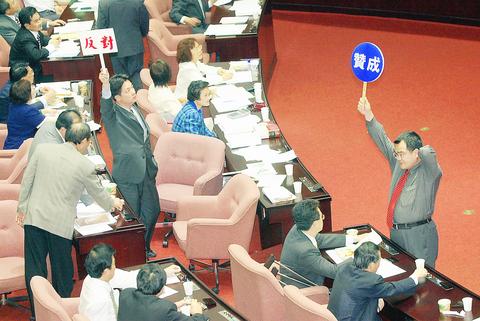Capping weeks of partisan wrangling, the legislature yesterday narrowly adopted resolutions that require the Taiwan High Speed Rail Corp (THSRC) to disclose its deals with subcontractors and ban further government loans to the firm unless it complies.
Proposals that would subject future build-operate-transfer (BOT) projects to legislative approval did not pass, however.

PHOTO: CHIANG YING-YING, TAIPEI TIMES
The series of rulings are not expected to disrupt the construction of the north-south rail project, which is slated to be completed in 2005 at a cost of NT$446.4 billion.
By a vote of 103 to 101, opposition lawmakers pushed through a proposal that obligates the THSRC to reveal the costs of individual subcontracts and related cost breakdowns.
Independent legislator Sisy Chen (
Saying that such practices would encroach on entrepreneurism, the THSRC has refused to make known information at issue.
The government has invested NT$8 billion in the bullet-train project and has promised to underwrite up to 86 percent of its finances.
With support from a number of TSU legislators, the lawmaking body voted 105 to 103 in favor of a resolution that bars the Postal Saving Fund from lending more money to the THSRC before it meets the above requirement.
Seeking to placate the opposition, the DPP lodged no protest against the proposal -- which also bans the state-run Taiwan Sugar Co from making further investments in the railway.
But the ruling party did succeed in quashing opposition attempts to subject the future BOT projects to legislative approval.
With a vote of 104 to 98, the ruling camp was able to block an opposition measure saying the government must obtain consent from the legislature before spending money on any BOT project.
The four major legislative caucuses all issued top mobilization orders, asking members to attend the showdown vote yesterday noon. They did not break for lunch, as the legislature is finishing off a budgetary review for state-run businesses this week.
The body will vote on nominees for Examination Yuan heads, Control Yuan members and Grand Justices next week.
After some admirable maneuvering, the ruling camp blocked by a vote of 104-100 another opposition proposal that would require a legal basis for all future BOT projects worth over NT$30 billion.
Experts have frowned on the proposal, saying it would discourage BOT projects, a much-touted recipe for the construction of large-scale public works amidst plunging revenue.
To avoid that, the legislature voted 104 to 94 to strike down a resolution that would free the government from co-paying compensation demanded by former contractor, the European Consortium.
The THSRC had awarded its electrical and mechanical biddings to the consortium, but later decided to switch to Japanese systems, allegedly bowing to pressure from the former KMT administration.
An international court to which the European consortium has taken its complaint is likely to grant its request of US$800 million in compensation for the decision.
Seeking to speed up the legislative review, all caucuses gave the nod to a proposal that bars original THSRC shareholders from participating in land development, communications and other projects along the railway in the case the project collapses.

A Chinese aircraft carrier group entered Japan’s economic waters over the weekend, before exiting to conduct drills involving fighter jets, the Japanese Ministry of Defense said yesterday. The Liaoning aircraft carrier, two missile destroyers and one fast combat supply ship sailed about 300km southwest of Japan’s easternmost island of Minamitori on Saturday, a ministry statement said. It was the first time a Chinese aircraft carrier had entered that part of Japan’s exclusive economic zone (EEZ), a ministry spokesman said. “We think the Chinese military is trying to improve its operational capability and ability to conduct operations in distant areas,” the spokesman said. China’s growing

Nine retired generals from Taiwan, Japan and the US have been invited to participate in a tabletop exercise hosted by the Taipei School of Economics and Political Science Foundation tomorrow and Wednesday that simulates a potential Chinese invasion of Taiwan in 2030, the foundation said yesterday. The five retired Taiwanese generals would include retired admiral Lee Hsi-min (李喜明), joined by retired US Navy admiral Michael Mullen and former chief of staff of the Japan Self-Defense Forces general Shigeru Iwasaki, it said. The simulation aims to offer strategic insights into regional security and peace in the Taiwan Strait, it added. Foundation chair Huang Huang-hsiung

PUBLIC WARNING: The two students had been tricked into going to Hong Kong for a ‘high-paying’ job, which sent them to a scam center in Cambodia Police warned the public not to trust job advertisements touting high pay abroad following the return of two college students over the weekend who had been trafficked and forced to work at a cyberscam center in Cambodia. The two victims, surnamed Lee (李), 18, and Lin (林), 19, were interviewed by police after landing in Taiwan on Saturday. Taichung’s Chingshui Police Precinct said in a statement yesterday that the two students are good friends, and Lin had suspended her studies after seeing the ad promising good pay to work in Hong Kong. Lee’s grandfather on Thursday reported to police that Lee had sent

BUILDUP: US General Dan Caine said Chinese military maneuvers are not routine exercises, but instead are ‘rehearsals for a forced unification’ with Taiwan China poses an increasingly aggressive threat to the US and deterring Beijing is the Pentagon’s top regional priority amid its rapid military buildup and invasion drills near Taiwan, US Secretary of Defense Pete Hegseth said on Tuesday. “Our pacing threat is communist China,” Hegseth told the US House of Representatives Appropriations Subcommittee on Defense during an oversight hearing with US General Dan Caine, chairman of the Joint Chiefs of Staff. “Beijing is preparing for war in the Indo-Pacific as part of its broader strategy to dominate that region and then the world,” Hegseth said, adding that if it succeeds, it could derail